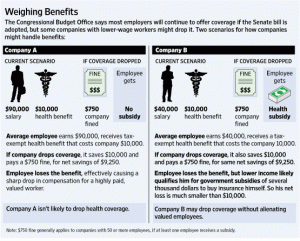Sixty Democratic members of the Senate wrapped up what they had begun a few days back. On December 21, the Slimy Sixty voted to end debate on their version of the health care bill, a vote commonalty referred to as Cash for Cloture, for the bribes it required. Republicans have been impotent in this debate. Their conduct while in power during the last decade has guaranteed—and certainly warrants—their neutered status for years to come. Besides, when Republicans do raise objections, these are generally procedural, not principled. No, it was the ConservaDems who got to call the shots and dip their snouts deep in the troughs.
A left-liberal blogger like the righteous Ezra Klein of the WaPo believes that “the senators making up this morning’s 60 votes actually represent closer to 65 percent of the population. Harry Reid has much to be proud of today,” he quips.
[One of my favorite observations in Paul Gottfried’s “Encounters” is the one about “the Archie Bunkers” of America having gone the way of the dinosaur. That generation, Paul writes, “Has been replaced by a multitude of vastly more radicalized versions of Meathead, Archie’s fashionable liberal son-in-law who by now could be an editorial writer for the Wall Street Journal.” Or the WaPo, like young Klein.]
I tend to agree with Ezra that Americans have driven this move to recognize a commodity/good (health care services) as a natural right.
Klein is celebrating:
“[T]his bill will do most of the things supporters hoped it would do: cover about 95 percent of all legal residents, regulate insurers, set up competitive exchanges, pretty much end risk selection, institute a universal structure that we can improve and enhance as the years go on, and vastly reduce both medical and financial risk for families.”
No doubt, the “118 new boards, commissions and programs” created by the government will deliver medicine like never before.
Chuckie Krauthammer has a few half decent suggestions—tort reform, deregulation, interstate competition—except that as an establishment Republican, Chuckie swims in pretty polluted waters. He believes that “insuring the uninsured is a moral imperative”; and that taxing “employer-provided health insurance” the way to go. As I said, always procedure, never principles: that’s the Republicans for you.
Click BAB’s “Health Care & Fitness” Search Category for more.
Update (Dec. 26): “Given the degree to which the insurance market is going to be further regulated,” I wrote in “Healthcare Hell Ahead,” insurers will gradually divest of their market share, leaving so big a gap that the State will assert the need to move in by ‘necessity.'”
Peter Schiff postulates about a “devious possibility. Perhaps our elected officials actually intend to bite the hands that feed them. They could double-cross insurance companies by not raising the fine in five years, thereby forcing the industry into bankruptcy as millions of healthy people opt-out. During the ensuing ‘insurance crisis,’ our courageous leaders could ride to the rescue with a nationalized, single-payer system.”
Schiff on why the Bill is the beginning of the end of private insurance industry:
“This first round of reform could be labeled as the ‘neutron bomb’ of the insurance industry: it leaves some of the private apparatus standing, but it irradiates whatever remains of the industry’s market viability.
The bill’s centerpiece is a clause prohibiting insurers from denying coverage based on a pre-existing medical condition. However noble and marketable an idea, this proscription removes the very basis upon which any insurance model operates profitably.
A system of insurance requires that premiums be collected from a pool of low-risk people so that funds are available in case a high-risk event befalls a particular person. In that way, premiums can be low and coverage can be widely available, even if the benefits offered are hypothetically unlimited.
For example, homeowners buy fire insurance even though their houses are very unlikely to burn down. Recognizing that a fire could wipe them out financially, most homeowners endure the cost of coverage even if they never expect to collect. The same model applies to health insurance in a free market.
However, the health care bill removes the need for healthy individuals to carry insurance. Knowing that they could always find coverage if it were eventually needed, people would simply forgo paying expensive premiums while they are healthy, and then sign on when they need it. But insurance companies cannot survive if all of their policyholders are filing claims!” …

